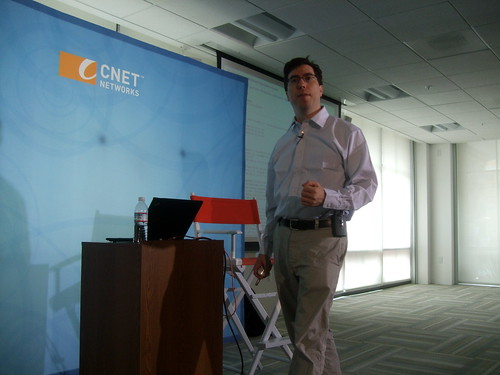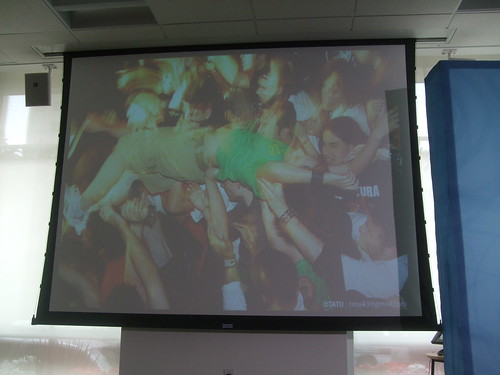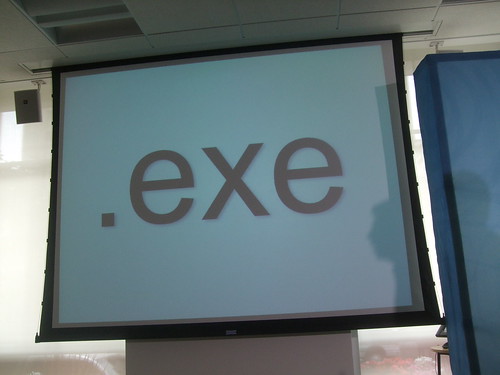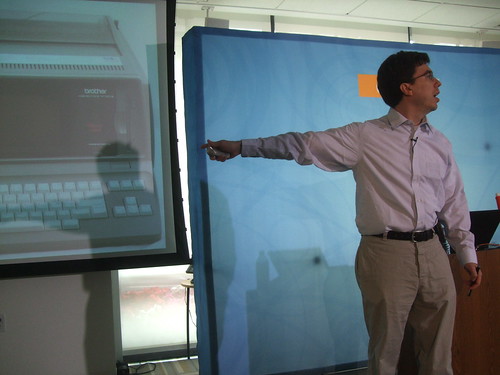Zittrain explains the future of the Internet

Oxford professor and Harvard pioneer Johnathan Zittrain came to the CBS Interactive offices in San Francisco on Tuesday to speak and sign copies of his new book "The Future of the Internet... and How to Stop It". His presentation was called Civic Technologies.
We can actually carve our technologies into one or two categories: civic or non-civic.
A civic technology is one that invites people to contribute to it, and the success of it depends on how many people choose to be a part of it.
When the Internet was conceived back in the 80s, they didn't need to have a business model. They didn't have to worry about moving data around.
But today, moving data around is like trying to move someone around in a mosh pit.
Back in the 90s, companies tried to use the Internet as a business model; Compuserve, AOL, and Prodigy, among others.
"You cannot build a corporate network out of TCP/IP" -IBM, 1992
With these civic technologies, you often run into a common problem. People say, "There goes the neighborhood..."
When AOL first built that land bridge from their isolated network to the Internet, people were like, "Oh, there's the AOLers". They don't share the ethos of the original network.
Email is a shared hallucination app with nobody at the top running it.
Civic Defense
There is no single map of the Internet. Instead, every router on the Internet sees through the fog and looks for it's nearest peer. The routers all trust each other. We trust every router on the net to tell us where it is.
In February, Pakistan tried to block YouTube. One small Pakistani ISP advertised exactly where it was, and then other routers around it said they were two clicks away. In less than 120 seconds, most of YouTube was blocked around the world.
What if 20 ISPs around the world, as a practical joke, decide to publish false routes for 20,000 sites? That would probably bring down the net, and NANOG would go nuts.
Wikipedia is definitely a civic technology. The idea of having articles that anyone can edit is actually a crazy idea. It's not perfect though; it still has the same, "Oh, there goes the neighborhood" feel. What is their civic defense model?
They have an administrator's notice board, which is an editable page itself. It's just a big pile of problems. There are people obsessive-compulsively reloading the noticeboard and they are solving the problems faster than they are coming up.
If all these people attended a Battlestar Galactica at the same time, Jimbo's site would be in trouble. Wikipedia is always about 45 minutes away from utter destruction.
Another example is the Apple II computer. Years ago, it was just a plastic box with some microprocessors.
Now, we are presented with task managers and lists of processes that we don't understand. What do alg.exe and lsass.exe do?
Is there a civil defense model for computing? Short answer: no.
The Internet is a polyarchtical, bottom-up civic technology. When the neighborhood goes, you either have to come up with your own self-defense, or get help from the commons; or join the commons.
We will see the end of the personal computer. "Here are the five approved applications you can use with this machine, and here are the five sites you are allowed to visit".
We will see a new generation of devices. Linux inside the TiVo is dying to jump out, but it can only be controlled with a dinky remote. The Amazon Kindle, the iPhone...
Steve Jobs said it himself in January of 2007, "You don't want your phone to be like a PC." But he still has control of it. His SDK is not "open". You cannot put chocolate and peanut butter together without piping it through Reece's.
Let's look at Facebook apps. They reserve the right to see if your apps make it onto the site. The new "Great Apps" program gives preferred app developers higher priority on their platform. They can throttle your app if they think it's being too active. They can pull some oxygen from it. Is this fair?
New non-civic technologies
Soon your stove-top kettle will have an IP address, and that might not be a good thing. Think about a toaster in a SaaS world.
You come down for breakfast and you see the message, "You have just gotten the latest update: you have a third slot".
Next morning, they rollback the update because the toaster heats up too fast.
You start to ask yourself, what did I buy? You bought a "breakfast-oriented relationship". Instead of owning it, you are a subscriber.
Back in the 19th Century, there was something called "the posse". They would deputize the public to help enforce the law. The police in the north would announce, "all able-bodied men must report slaves back to the south". This was the last thing able-bodied men wanted to do. I was dead-letter on the books; it wasn't the civic 'umph'.
How do we create and reinforce new civic technologies?
Digg is a hybrid civic technology. What's popular is a function of how many people think it's popular.
This gives hope to a site like Subvert and Profit, a service that accepts payment for diggs.
The Wikipedians wouldn't go for this deal.
Another example: couchsurfing.com - a social network for people looking for a place to sleep.
There was a time when hitchhiking was a civic technology. Now it's a dangerous thing to do. Then a guy named Craig starts a list in San Francisco, and hitchhiking is back again.
Can we embrace the civic moment of this time, or is it just cash and carry?
The bad guys have already decided that they wanna be bad guys. It's their job, that's their advantage. Our advantage is numbers and good will.
Zittrain's projects
StopBadware.org is a community of software experts that will tell you if it's safe to run certain programs on your computer.
Herdirt Network Health - A distributed model for online threats.
Pick up a copy of his book, The Future of the Internet and How to Stop It.



